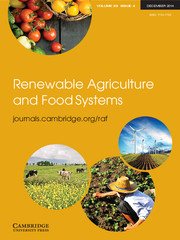Article contents
The role of cooperative business models for the success of smallholder coffee certification in Nicaragua: A comparison of conventional, organic and Organic-Fairtrade certified cooperatives
Published online by Cambridge University Press: 08 May 2012
Abstract
Supported by policy-makers and non-governmental organizations (NGOs), coffee farmer organizations obtain organic and Fairtrade certifications to upgrade their coffee and, thus, increase returns to their members. Whether this and other upgrading strategies fit into the business model of the cooperative and lead to success are often not considered. This research aims to identify similarities and differences between conventional and certified cooperatives and the resultant impact on farmers' incomes. We analyze the business models, upgrading strategies, and strengths, weaknesses, opportunities and threats (SWOT) of seven conventional, organic and Organic-Fairtrade certified coffee cooperatives and link these to members' coffee gross margins. We use data from over 100 in-depth qualitative interviews and a household survey of 327 cooperative members in northern Nicaragua. Results indicate that cooperatives often apply the same upgrading strategies despite very different business models and SWOT. There are also many commonalities of SWOT among cooperatives but no clear-cut differences between conventional, organic and Organic-Fairtrade certified cooperatives. The qualitative comparison of coffee gross margins among the cooperatives shows no clear income effect from participating in certified coffee production and certified cooperatives. It indicates, rather, dependence of gross margins on yield levels, the business model and upgrading strategies of the cooperatives. Upgrading through certification seems only successful with a suitable business model and other upgrading strategies. Policies should focus on (i) increasing as well as stabilizing coffee yields, and (ii) on the institutional framework of cooperatives by offering strategic support, credit access, external auditing of cooperatives and the establishment of a functional national coffee institute.
Keywords
- Type
- Research Papers
- Information
- Copyright
- Copyright © Cambridge University Press 2012
References
- 48
- Cited by


